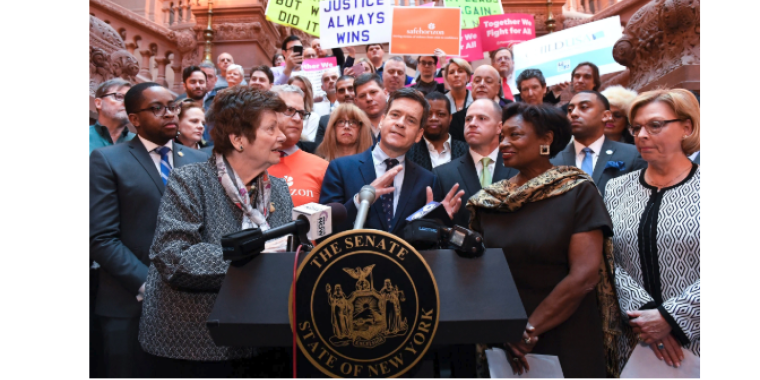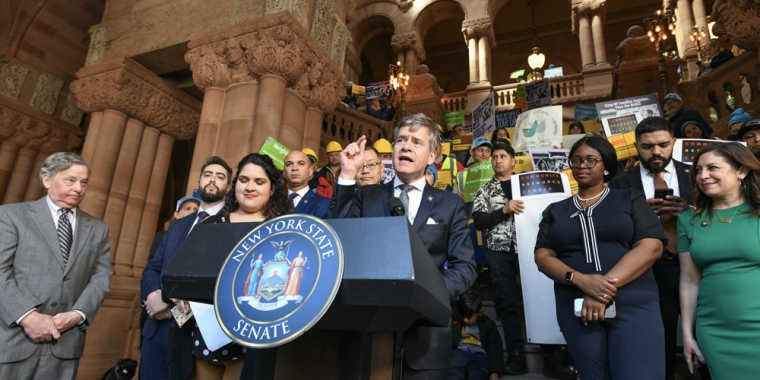
They Were Sexually Abused Long Ago as Children. Now They Can Sue in N.Y.

ALBANY — For more than a decade, victims of childhood sexual abuse in New York have asked lawmakers here for the chance to seek justice — only to be blocked by powerful interests including insurance companies, private schools and leaders from the Roman Catholic Church and Orthodox Jewish communities.
As activists and Democratic officials pushed to strengthen protections for child abuse victims, those opposing interests — wealthy and closely tied to members of the then Republican-controlled State Senate — warned that permitting victims to revive decades-old claims could lead churches, schools and community organizations into bankruptcy. For 13 years, the so-called Child Victims Act foundered.
But in November, Democrats won control of the Senate. And on Monday, both the Senate and Assembly overwhelmingly approved the Child Victims Act, ending a bitter, protracted battle with some of the most powerful groups in the state. Gov. Andrew M. Cuomo has promised to sign the bill into law.
Every senator, Republican and Democrat, voted for the bill — even though it never even came to the Senate floor for a vote under the Republican majority. The bill passed the Assembly 130-3.
The bill greatly extends New York’s statutes of limitations for childhood sex abuse, which had required that criminal or civil charges be brought before the survivor’s 23rd birthday. That put New York’s laws among the most restrictive in the nation. (Only Mississippi and Alabama have similarly stringent statutes, according to advocates.)
Many other states allow child sexual abuse claims to be brought decades after the assault. Nine have no statutes of limitations at all.
Under the new law, prosecutors could bring criminal charges until a victim turned 28, and victims could sue until age 55. The bill would also create a one-year “look-back window,” during which old claims that had already passed the statute of limitations could be revived.
“It gives meaning and purpose to everything I and my fellow survivors have gone through,” said Brian R. Toale, who has traveled to Albany for years to press legislators on the Child Victims Act.
Mr. Toale, who grew up on Long Island, said the moderator of his high school’s radio club sexually abused him when he was 16 years old; it was not until he was 62 that he wrote to his school to tell administrators of the abuse.
At a news conference at the Capitol, legislators and survivors spoke — with a mix of joy, relief and regret — of the long battle for passage.
“You have bared your pain for 13 years,” Assemblywoman Linda Rosenthal, one of the bill’s sponsors, said on Monday while thanking survivors for their advocacy.
With the bill’s passage, she said: “You will be able to name your abuser. The institutions that harbored them. And moved them among other institutions so they could harm other children.”
On the floor of the Senate, Senator Andrea Stewart-Cousins, the new Democratic majority leader, offered an emotional apology.
“We apologize for not hearing you soon enough,” she said. “We apologize for making you wait so long.”
Four lawmakers — Senator Alessandra Biaggi and Assemblywomen Catalina Cruz, Rodneyse Bichotte and Yuh-Line Niou — identified themselves during debate as victims of sexual abuse.
“On behalf of survivors everywhere, I cast my vote in the affirmative,” Ms. Cruz said.
Mr. Cuomo, who held a separate news conference to announce his support, said he was following the lead of Pope Francis, who has called for a fuller reckoning of crimes committed by priests and other church officials.
“You cannot deny what happened,” Mr. Cuomo said, flanked by a group of victims, many of whom are now in their 50s and 60s. “You cannot deny that there was significant abuse in the Catholic Church. You cannot deny that it was not handled appropriately. And you can’t deny that people were hurt.”
The fight over the bill’s passage had pitted activists — many of whom made their case publicly and emotionally — against influential groups that often preferred to work against the bill in private. While survivors held rallies, pressed newspaper editorial boards and, at least once, arrived at Mr. Cuomo’s Midtown Manhattan office unannounced to demand a meeting, groups including the American Insurance Association and the Boy Scouts of America quietly hired highly paid lobbyists to oppose the bill.
New York’s Catholic Conference, led by Cardinal Timothy M. Dolan, emerged as the most forceful and public in its opposition; since 2012, it spent more than $1.8 million on lobbyists in Albany to represent its interests.
Less than two weeks ago, Cardinal Dolan wrote an opinion piece in The Daily News declaring that he had to protect the church from Mr. Cuomo’s efforts to “single out the church and weaken its ministry.”
The state’s bishops later declared that they would support the Child Victims Act so long as it applied equally to public and private institutions — a provision that the bill’s sponsors readily adopted.
“No one can say that this legislation unfairly targets one group over another,” said one of the sponsors, Senator Brad Hoylman.
In a statement after the bill’s passage in the Senate, Dennis Poust, a spokesman for New York’s bishops, said the group would call for even stronger protections than the Child Victims Act.
Michael Polenberg, the vice president of government affairs at Safe Horizon, a New York City nonprofit that helps victims of sexual abuse and domestic violence, suggested that the church’s sudden turnaround was disingenuous.
“They fought the bill tooth and nail until it was going to pass,” he said.
The new legislation would put New York well within the upper half of states nationwide in terms of protections for child victims, according to Michael Pfau, a lawyer who has represented victims of childhood sexual abuse. But, he added, it would still fall short of making the state a national leader. California introduced a one-year look-back window like New York’s in 2003 but is considering opening another one to accommodate the victims who could not be addressed in time.
Even as he celebrated the bill’s passage, Mr. Toale added that the next year would require intense work to notify survivors across the state of their rights during the look-back window.
“The work starts now. A different kind of work starts now,” he said. “A one-year window is a very short period of time. There’s a lot of people to get that information to.”

